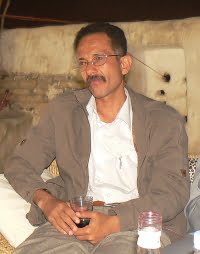
Ali Al-Muqri
- Yemen
- Zu Gast beim ilb: 2009
Born in 1966 in Taiz, the most liberal city in the highlands of conservative North Yemen, Ali Al-Muqri began writing at the age of eighteen.. He earned a modest income from writing a few newspaper articles, soon followed by his first avant-garde poems and short stories. The Ministry of Culture in what used to be North Yemen banned a collection of his poetry for being too erotic. As the national climate following reunification with South Yemen became conducive to setting up independent journals, Ali Al-Muqri became much in demand as a cultural editor of mostly progressive, oppositional publications.
Since 1997 he has been editor of
span style=”font-family: “Times New Roman”;”>»al-Hikma
span style=”font-family: “Times New Roman”;”>«, the organ of the Yemenite Writer
span style=”font-family: “Times New Roman”;”>’s Association. He has directed the young literary journal
span style=”font-family: “Times New Roman”;”>»Ghaiman
span style=”font-family: “Times New Roman”;”>« since it was established in 2007.
Ali Al-Muqri
span style=”font-family: “Times New Roman”;”>’s literary endeavours resonated in specialist circles, but he became widely known following the publication at the end of the 1990s of an Islamic, scientific study entitled
span style=”font-family: “Times New Roman”;”>» Al-chamr wan-nabidh fi I-islam
span style=”font-family: “Times New Roman”;”>« (tr: Alcohol in Islam published as a book in 2007). He had to cancel the series after two parts when the study came to the conclusion that Islam did not actually forbid alcohol, which provoked instinctive reactions from the Islamist scene
span style=”font-family: “Times New Roman”;”>– the author found himself gaining a reputation (and at one point was in real danger) which was decidedly beneficial to his carefully groomed image. He subsequently reinforced his reputation as a provocateur of Islamists through erotic poetry and articles against religious repression. Al-Muqri likes to quote from Nietzsche:
span style=”font-family: “Times New Roman”;”>»Alles Verbotene zieht mich an
span style=”font-family: “Times New Roman”;”>« (tr: I am drawn to what is forbidden). His work does indeed seem to support this claim.
In 2008 his first novel appeared, highly acclaimed by the Arab press:
span style=”font-family: “Times New Roman”;”>»Ta
span style=”font-family: “Times New Roman”;”>’m aswad, ra
span style=”font-family: “Times New Roman”;”>’iha sauda
span style=”font-family: “Times New Roman”;”>« (tr: Black Taste, Black Smell) is a documentary, unsparingly open narrative about a group of
span style=”font-family: “Times New Roman”;”>›Achdam
span style=”font-family: “Times New Roman”;”>‹, who form a racially discriminated, largely taboo parallel society in Yemen. This is the first time they have been the subject of a literary work. The first-person narrator breaks with his own
span style=”font-family: “Times New Roman”;”>›white
span style=”font-family: “Times New Roman”;”>‹ Yemeni society and, through his relationship with a
span style=”font-family: “Times New Roman”;”>›black
span style=”font-family: “Times New Roman”;”>‹ Achdam woman is accepted into their community. He encounters here a variety of fates which tell of humiliation and prejudice, but also of pride and a love of life. Al-Muqri seems to favour the physical in his novel: the protagonists do not speak of love, but of the
span style=”font-family: “Times New Roman”;”>›smell of the body
span style=”font-family: “Times New Roman”;”>‹ which incites to flight and rebellion. His last novel,
span style=”font-family: “Times New Roman”;”>»Alyahudi alhali
span style=”font-family: “Times New Roman”;”>« (2009; tr: The handsome Jew), is about a love story between a Muslim woman and a Jew, set in troubled times in seventeenth century Yemen.
Ali Al-Muqri lives in Sana
span style=”font-family: “Times New Roman”;”>’a.
© international literaturefestival berlin
Nafidha lil-djasad
Kairo,1987
Tarmimat
Sanaa,1999
The Ministry of Culture
Sanaa, 2004
Yahduthu fi n-nasian
Sanaa,2003
Al-Chamr wan-nabidh
fi l-islam
Beirut, 2007
Ta’m aswad, ra’iha sauda
Dar Al Saqi
Beirut, 2008
Alyahudi alhali
Dar Al Saqi
Beirut, 2009
